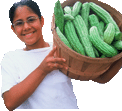Back to the Guide to Farming Table of Contents >>
Selling Plants
If you sell plants for landscape use including bedding plants, perennials, shrubs and trees grown in a nursery or greenhouse, you will need to be licensed as a Retail or Wholesale Nursery, or Plant Grower by the NYS Dept. of Agriculture & Markets. If you sell cut flowers or houseplants the license is not required. As a plant seller your greenhouse/nursery crops are subject to inspection to protect the customer from potentially diseased or insect infested plant materials.
For licensing information, contact the NYS Ag & Markets Division of Plant Industry – http://www.nys-permits.org/ or call the Albany office – 1-800-342-3464 or 518-474-8275; Regional Inspectors will visit your production facility to inspect plants before you begin sales and thereafter annually. There is a fee for the license.
Selling Produce
No licenses are required. Produce must be sold free of debris and in clean containers. Bulk displays are not subject to grading, labeling or packaging.
Grade and Standards: Some produce is subject to USDA grade and quality standards if packaged; this includes: potatoes, apples, lettuce, and grapes. Grade, quantity of contents, name and address of producer are required on all closed packages. NYS Agriculture & Markets enforces quality and grade standards. For grading information consult the following website for fact sheets pertaining to each of the above crops: www.agmkt.state.ny.us/FS/general/farmprods.html
Follow Good Agricultural Practices: In order to protect food from microbial contamination, producers should follow good agricultural practices. To prevent contamination of produce and water supplies, follow good sanitation practices, avoid introducing raw manure into fields, test irrigation and wash water for bacteria, change wash water regularly. Test water for bacteria annually and maintain good records. For information consult: www.gaps.cornell.edu or call 315-787-2625.
Slaughter and Sale of Farm-raised Meats
The best source of information on marketing your meat is “A Resource Guide to Direct Marketing Livestock and Poultry”, available in PDF from: www.smallfarms.cornell.edu/pages/projects/workteams/LP/livestock.cfm. Here is a brief summary of some regulations.
Poultry exemption: Farm-raised poultry is exempt from NYS and USDA inspection if the farmer raises and slaughters not more than 250 turkeys OR not more than 1000 of all other poultry (chickens, ducks, geese, etc.) per year. Four birds of other species are equivalent to one turkey. If you raise more than this per year the birds must be processed in a licensed facility and stamped if for commercial/retail sale.
Other Meats (beef, lamb, goat, pork):These farm-raised meats must be processed in a USDA licensed facility if intended for commercial/retail sale. These meats can be processed in NYS custom exempt slaughter plant only if they will be consumed by the animal’s original owner, employees, or non-paying guests. In other words, a live animal can be sold directly to the customer, then processed in NYS custom exempt slaughter plant. Such meat must be stamped “Not for resale.” Further processing of meat such as making sausage, etc. must be done in a USDA certified facility or NYS certified processing facility/kitchen holding an Article 20-C license. See Fact Sheet #28 for more info on 20-C licensing.
Exotic Animals: bison, deer, rabbits, and ratites must be slaughtered in a NYS Custom Exempt Plant if
the meat will be sold. Inspection is not necessary for retail sales (to end user).
For questions about meat slaughter and sales, contact NYS Ag & Markets – 518-457-4492
Selling Fish
Whole fish: Without any special permits, you may sell a fresh whole fish at your farm to a private customer. You may bring completely chilled fresh whole fish to a farmer’s market and sell to a private customer. Keep fresh whole fish at 32°F with crushed ice or in a refrigerated unit.
Eviscerated fish: Entire gut contents are removed and the fish is thoroughly rinsed with fresh water that is 38°F or lower (water is of public source or from a tested well.) Chill the fish to 32°F immediately. At this point, the fish can be frozen and kept in a frozen state for sale. Frozen eviscerated fish may be sold at the farm or at a farmer’s market; fresh and properly chilled eviscerated fish may be sold at a farmer’s market or at the farm.
Fillets – Filleting fish or any similar processing requires an Article 20C Food Processing License at your
farm or a facility off-farm that carries a current 20C Food Processing License. You may transport your
fish to a 20C facility and use it temporarily (usually for a rental fee). Such fish may be sold to
individuals, stores, or restaurants if in a frozen state. Fresh fillet sales requires an Article 28 Retail Food
Store license (where food and food products are offered to the consumer and intended for off-premises
consumption and conducts no food processing). As of June 2010, an Article 20C license fee is $400.00
and an Article 28 license fee is $250.00.
Rules and regulations surrounding aquaculture-raised fish are subject to change. Contact your regional
NYS Department of Agriculture and Markets Food Safety and Inspection Division office at 518-457-4492 or www.agmkt.state.ny.us/FS/FSHome.html
Selling Eggs
Egg cartons must be marked with grade and size. Eggs may be sold in bulk displays but grade and size must be indicated. Eggs should be washed and candled. Cartons must include the name and address of producer and the date packed. For a fact sheet on egg sales consult: www.agmkt.state.ny.us/FS/general/farmprods.html
Selling Honey and Maple Syrup
These products are exempt from licensing if you do not add ingredients or repack. Production facilities must be clean and sanitary. If you make specialty flavored honey or maple products, you must have an Article 20-C license. Maple syrup is subject to grade identification. For more information on the sale of Maple Syrup request Circular 947 from the NYS Dept. of Agriculture & Markets or check this website for a copy: www.agmkt.state.ny.us/FS/general/farmprods.html
For all other food inspection questions, contact NYS Dept. of Agriculture & Markets – Division of Food Safety & Inspection,
at 518-457-4492 or www.agmkt.state.ny.us/FS/FSHome.html
Making/Selling Wine
Regulations can be found at the following website: www.abc.state.ny.us – NYS Liquor Authority, Division of Alcohol Beverage Control (ABC), Albany. There are 4 types of winery licenses that apply to the following situations: individuals who make wines without having a vineyard; a retail facility that retails wines but is neither a producer or processor of grapes; a farm winery must have its own vineyard and processing facilities and any purchased grapes must be 100% NY grown; a special farm winery does not have its own processing facility but works with another established wine processing facility. Farm wineries may sell their own wine at their wineries, at NYS Farmers Markets and to restaurants and retail stores in NYS.
For assistance in developing a farm winery consult the following sources:
New York Wine & Grape Foundation: www.newyorkwines.org, 585-394-3620
Cornell Viticulture & Enology Program – Geneva: http://www.grapesandwine.cals.cornell.edu or call 315-787-2277
NYS Liquor Authority (ABC) License contact information:
NYS Liquor Authority (ABC) License contact information:
Cornell Grape Program – www.fruit.cornell.edu/grapes.html
Cider
Requires an Article 20-C license for processing. Good manufacturing practices must be followed. Apples must be firm and washed. Pasteurization or Ultra Violet treatment is required. HACCP (Hazard Analysis Critital Control Point) plans are required for cider and juice processing facilities if selling wholesale. For information contact: Division of Food Safety & Inspection, at 518-457-4492 or www.agmkt.state.ny.us/FS/FSHome.html
Milk
Processing facilities are regulated by the NYS Department of Agriculture & Markets Division of Milk Control and Dairy Services – www.agmkt.state.ny.us/DI/DIHome.html or 518-457-5731 – Bill Fredericks.
The primary resource to familiarize yourself with in the development of your plant is New York State Department of Agriculture and Markets Circular 958 (Part 2), which covers the rules and regulations for operating a milk processing facility in NY.
Milk can not be transported from a farm to a processing facility without a license and dairy products processed in your home kitchen or a commercial kitchen can not be sold to the general public. You must have and maintain a certified milk processing plant on your farm if you plan to sell dairy products to the public.
Once a plan has been developed, you may also want to contact the Cornell Department of Food Science Cooperative Extension (http://foodscience.cornell.edu/cals/foodsci/extension/index.cfm) or the Dairy Plant at SUNY Morrisville. They offer instructional programming schools/workshops for dairy processors and have staff that may be able to help review your plans and offer advice.
Selling Raw Milk
Due to the potential liabilities of selling unpasteurized milk to the public, it is highly discouraged by the State and the Cornell University Department of Food Science. However it can be legal. Your farm may sell raw fluid milk if you apply for permits and meet several additional tests and requirements that other milk processing facilities do not have to meet.
Hard cheese made from raw milk cheese may be sold to the public if labeled raw milk cheese and aged at least 60 days. A permit is still required. More information on selling cheese is available at the NY Farmstead Cheese Producers website, http://www.nyfarmcheese.org/
This fact sheet is part of the Guide to Farming in NY by Monika Roth et al, published by the Cornell Small Farms Program and Cornell Cooperative Extension. Fact sheets are updated once annually, so information may have changed since last revision. If you are reading a printed version of a fact sheet, compare revision date with online fact sheet publish dates at https://nebeginningfarmers.org/publications/farming-guide to make sure you have the latest version.

 Information for beginning farmers.
Information for beginning farmers.
